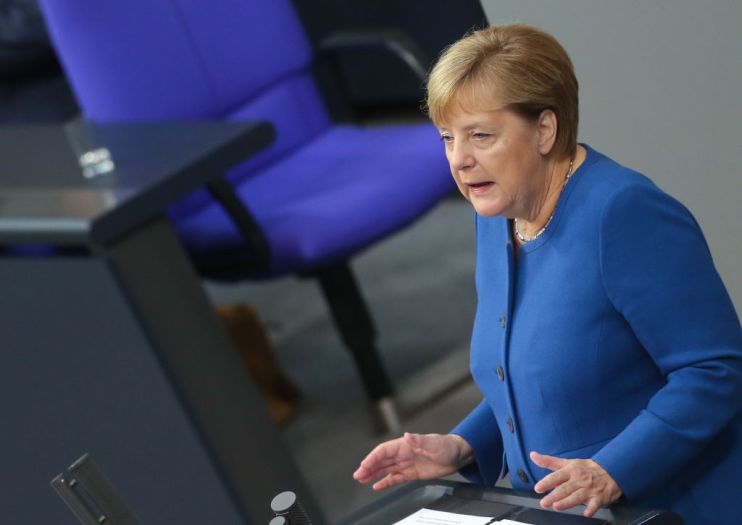The brain-dead era of Angela Merkel is limping to a finish

The always interesting French President Emmanuel Macron got it precisely wrong in November when he airily derided Nato — the most successful alliance in the history of the world — as experiencing “brain death”. Brazening it out, Macron doubled down, defending his remark at the Nato summit of last week.
As I never tire of explaining to the scores of ahistorical European Union cheerleaders that I am doomed to meet at conferences, it was Nato, and not the EU, that won the Cold War without the firing of a shot.
It is the unserious, scandalous lack of defence spending in Europe — as a series of American presidents have been bewailing for a generation — that is the great danger to transatlantic relations, not some perceived (and very convenient for France, which does not meet Nato’s agreed target of spending two per cent of GDP on defence) lack of intellectual direction that is the problem here.
But I think the Elysee Palace is just indulging in a bit of misdirected anger. For Macron’s ambitious term in office — and I readily credit that he is the only major European leader who really understands the continent’s present existential crisis and is at least trying to rectify it — has been thwarted by the do-nothingism of Chancellor Angela Merkel.
Over the past decade-plus of her somnambulant reign, Germany has functioned as a policy black hole, where all good ideas go to die.
Macron is the case in point. Correctly seeing that the European project has hopelessly bogged down — with the continent experiencing non-existent growth rates, being a military pygmy, and divided over the endless euro crisis and migration issues — the president set about rebuilding the essential Franco-German motor for European reform.
Aware that Berlin has hidden behind traditional French profligacy as an excuse to put off real discussions of European reform, Macron set about changing reality.
Amazingly, he managed the first significant labour market reforms in the history of the French Fifth Republic, successfully defying the French street. Now, in triumph, Macron turned to Merkel, announcing via his deeds that France could be economically trusted.
In turn, Macron must have hoped that future debt mutualisation (though debts accrued up until now would doubtless remain national), a genuine European finance minister, and an inner core (centred around Paris and Berlin) which actually moved forward with ever-increasing integration, could all be on the agenda.
But then, in true brain-dead fashion, Merkel looked at her shoes, and did nothing. Macron’s gamble, which had obviously cost him significant political capital, was wasted.
It turns out that the German elite did not really object to France’s old free-spending ways. Rather, they had merely used them as an excuse to do nothing, which was their preferred policy course all along.
But at last, the overrated era of Merkel is limping to a close. The present, unloved, grand coalition of her Christian Democrats (CDU) and the Social Democrats (SPD) is marooned policy-wise, serving time rather than accomplishing anything at all. But the SPD, haemorrhaging support as junior partners in coalitions often do (think of the Clegg-era Liberal Democrats), may have finally had enough.
Recently battered in regional and European elections — as the formerly-populist Greens take its place as the major centre-left party in Germany, while the populist leftist Linke party and the populist far-right AfD also make gains — the SPD has at last been goaded into action.
Picking their fifth leadership team in the last eight years, the party chose two utterly unknown co-leaders, Saskia Esken and Norbert Walter-Borjans — neither of whom have ever held leadership positions in the increasingly discredited party.
The duo campaigned on the proposition that the grand coalition should be brought to an end, unless Merkel’s CDU committed to a raft of new spending measures that her party is highly unlikely to live with. Failing this policy U-turn, the CDU would have to soldier on as an even weaker minority government, or new elections would have to be called.
While the new SPD leadership, terrified by the real electoral drubbing awaiting them, have walked back their threat over the past week, the grand coalition remains in a policy coma.
The end of the Merkel era should be welcomed by anyone who wants to see Europe succeed. However, if her hand-picked successor — a Merkel mini-me named Annegret Kramp-Karrenbauer — becomes Chancellor, do not expect anything much to happen.
Only with the succession going to the CDU’s hard-driving Friedrich Merz, will Macron have the partner he needs to give Europe a chance to right its absolute decline.
Germany has been brain dead for a long time; if Europe is to recover, it must finally wake up.
Main image credit: Getty